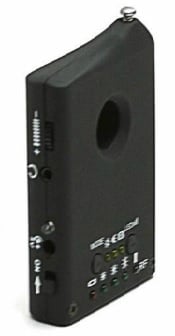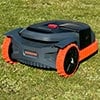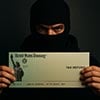Now that tech is smaller and cheaper than ever, it's become easy to install cameras almost anywhere. In fact, once you start looking, you may realize that cameras are everywhere: on traffic signals, in parking lots and inside stores. If you're reading this article on your phone while waiting for your morning coffee, there's probably a camera keeping an eye on you right now. You may even have some "hidden" cameras of your own, like Dropcams for home security, nanny cams to watch the baby or a video doorbell to see who's knocking.
These cameras have plenty of perfectly legitimate uses. They can provide security in public spaces and prevent theft in businesses. The problems arise when they're used for nefarious purposes, which happens more often than any of us would like. Earlier this year, police arrested a man who had secretly recorded women and girls in changing rooms at northern Virginia shopping malls. And, Airbnb has had ongoing problems with renters finding hidden cameras planted by hosts in places where guests should expect privacy. (The Airbnb regulations do allow hosts to place cameras in common areas, but they must disclose their use.)
One of the problems is that these tiny, inconspicuous cameras can be easily bought online. Browsing Amazon for hidden cameras is a little disconcerting. Cameras are disguised as alarm clocks, power adapters, smoke detectors, photo frames and even water bottles, most of them wireless and battery powered. These cameras are easy to obtain, and most require no technical skills to install, meaning anyone with ill intent could place them in a public place and watch you when you're unaware.
Aren't Hidden Cameras Illegal?
Laws pertaining to hidden cameras vary from state to state, so you'll want to check your local laws to find out the specifics in your area. The matter typically comes down to where you can expect to have a "reasonable expectation of privacy." There are certain spaces you would expect to be private, like bathrooms, dressing rooms, hotel rooms and locker rooms, and surveillance cameras placed in such areas are typically illegal. (However, if a sign informs you that you're under surveillance somewhere like outside a dressing area in a store where there are cameras to discourage theft, the cameras are typically considered legal.) In spaces that aren’t private, like browsing a shopping mall or walking down a city street, cameras are typically legal whether they're hidden or not.
Of course, the fact that hidden cameras might be illegal doesn't stop people from placing them, so it's up to you to remain vigilant.
How Can You Be Sure You're Not Being Recorded?
Cameras are small and often disguised, so the first thing to do is to take a look around. Not everyone placing a hidden camera does it in the smartest way, and you may be able to find them with a careful examination of the room. Look for the following tell-tale signs.
- Wires in unexpected places or wires that don't seem to go anywhere While many cameras are wireless, unexplained wiring could lead to a hidden camera.
- Lights A camera designed to be stealthy won't have any obvious signs like this, but cameras not designed to be hidden often do, and if the person who placed the camera wasn't careful, this can be an obvious giveaway.
- Small holes in walls or other places It only takes a pinhole for a camera lens to see into a room. Some types of hidden cameras take advantage of this by hiding in innocuous objects with a small hole for the camera.
- Objects out of the ordinary If you're in a familiar place, look for anything that's new or has been moved.
Another low-tech method of finding hidden cameras is to listen. While this won't catch every camera, some motion-sensitive cameras make a soft click or buzz as they turn on when someone walks by. In a noisy environment, you definitely won't be able to hear them, but if you're in a place where you can turn off lights, radios, televisions and other sources of sound, you may be able to hear a camera activate. You can also try turning out the lights and scanning the room with a flashlight to look for lens reflections.
If the hidden camera is living streaming video, you may be able to see it on the local Wi-Fi network. Software, like Nmap for computers, or apps like Fing for iOS and Android devices will scan whatever Wi-Fi network your computer, smartphone or tablet is connect to and list the devices.
Unfortunately, the above methods aren’t foolproof — but don’t give up just yet. While not all hidden cameras produce obvious visible (or audible) signs of their presence, every camera has a lens that reflects light whether it's on or off. You should be able to spot a camera by doing a thorough scan of the room with a light source, looking for a glint of light as it reflects off the camera sensor. This method still isn't perfect, as you'll need to shine the light from the right angle and, with some devices, be fairly close to the camera to spot it.
The most straightforward way to find a hidden lens using a light source is to turn off the lights and pan a flashlight around the room. Go slowly, and examine suspicious places from multiple angles. If you see glints of light where there shouldn't be — areas where there are no mirrors, glass or other reflective surfaces — you may have found a camera. Mirrors can be suspicious, too, because you won't be able to see a camera hidden behind them.
Make your search easier by using a camera-detecting app on your smartphone. These apps use your smartphone's flash to light up camera lenses and help you detect them, though many have received negative reviews, which speaks to how tough it can be to spot a hidden camera. For iPhone, there's Hidden Camera Detector ($4.99); for Android, try Glint Finder (free, with advertisements). Hidden Camera Detector is a bit more helpful, as it automatically pinpoints suspected cameras on your phone's screen. Glint Finder, on the other hand, flashes your smartphone's light rapidly to make it easier to pick up a reflection, but it's on you to find the source. With either app, you'll need to be within a few feet of a camera to spot it.
The advantage of these apps is cost and accessibility. While you can purchase professional-grade camera detectors (more on those in a minute), they come with a notable price tag, while these apps are very affordable. And if you need to hunt for a camera unexpectedly, you're likely to already have your smartphone with you. If nothing else, these apps make a good stop-gap method for finding hidden cameras until you get a better solution.

Wired and Wireless Camera Detector
Get a Hidden Camera Detector
A professional-quality hidden camera detector is both easier to use and more effective. You can get one for under $100. Professional detectors offer two methods of finding a camera: either they look for that glint from the lens (much like using a flashlight or smartphone), or they detect RF broadcasts from a wireless camera. Some detectors rely on one technology or the other (the cheapest detectors pick up RF), while pricier models include both, a combination of features that are effective at finding different kinds of cameras.
To make visually finding a hidden camera easier, detectors use multiple flashing LED lights — or in more expensive models, lasers — to help light up camera lenses. They're as simple to use as a flashlight. Simply hold them up to your eye (make sure the lights are facing away from your eye) and activate them while looking around the room. Just like a flashlight or smartphone, you'll have to hit the camera from the right angle to tell it's there, so you'll want to take a slow, careful look around the room, focusing on specific areas where a camera might be hidden. A camera lens should light up in the detector's viewfinder, making it easy to spot.
Detecting cameras via RF can be even easier. Most detectors will beep when they find a signal, giving an audible indication when you get near a potential camera. The snag with RF detectors is that there are lots of gadgets that can transmit RF, which means these detectors will either send you straight to a camera or on a wild goose chase for a lot of things that aren't cameras. On top of that, if the camera is turned off or simply not transmitting, there won't be anything for the RF detector to pick up. In the end, even though it takes more time, using a detector that looks for camera lenses can be more effective.
If you're looking to upgrade from an app to a stand-alone detector, try the Wired & Wireless Camera Detector ($59). When turned on, the detector can be set up to vibrate or beep to tell you you're near something that's transmitting, letting you know you could be near a hidden camera even when it's tucked in your pocket. For finding the hidden camera, hold the viewfinder to your eye and look around the room until it spots something.
If you're looking for professional grade equipment, try the Stealth Camera Lens Finder ($445). At just over four inches long, it's small enough to easily fit into a purse, and it uses simple, one-button activation. It doesn't detect RF, but that helps keep it simple to use. It can uncover hidden cameras even if they're turned off.
What Should I Do if I Find a Hidden Camera?
Even though you can find cameras on your own with a detector, it's best to contact the authorities if you do find one. Your local police will not only be able to remove the camera but also find whoever put it there — and keep them from spying on you or anyone else.
[Images: hidden camera concept via Shutterstock, Brickhouse Security]
The article was originally published in 9/2011, and last updated on 4/10/2019
















From Gabe on December 30, 2020 :: 11:52 am
People stall me on the street , at home, in stores..my family and my wife’s family say I take everything for granted..I worked in aerospace..had a little drug issue..Im also a graffiti artist which they all hate including my friends..but it’s my therapy along with surfing..so I would paint at night , shoot heroin in the bathroom at work and then speak to govt officials about how our programs are running along with our new satellites ..this job will remain nameless but then I went to space x and things got really weird..I didn’t mind shooting dope in their bathrooms..hey elon I’ll do it again if I could after the shit you put me through..I should have caught the first tag in space when I worked on the dragon 5 capsule..anyway I became an asshole so maybe I deserved some of this..but I swear people would harass me on the street, stores, while driving, spit in front of me, do disrespectful things, cut me off, shine bright lights and hazards..they would honk or drive fast when I was about to do drugs or take a leave..they even knew when I was jerking off this was unreal it drove me nuts for 7 years..still is..I realized I might have cyber sickness..too many electronics in the house..I even got to the point where I removed my crown in my mouth cause I thought there was a mind reader in there cause I swear everyone knows what I’m thinking or where I’m going..I even got this treatment in other countries..I’m still here and I’ll never give up…I will help those who are facing this kind of treatment that to me is like living in the third reich..I will be successfully and remember those who disrespected me..I needed a lesson but not like this ..where you think of turning suicidal..that’s too far I hit rock bottom..
Reply